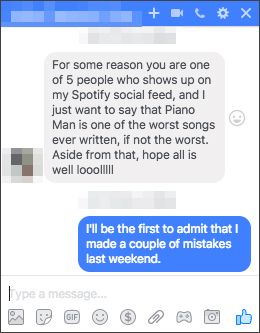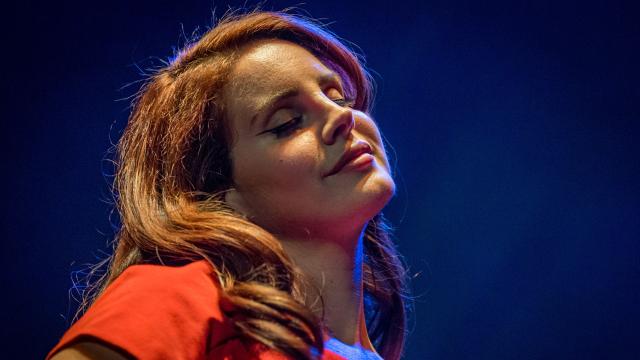I’m listening to Lana Del Rey right now. Her first album dropped during an emotional phase of my life, and while I’m sometimes embarrassed to admit it, I really like Born to Die. But, until a week ago, I avoided listening to it because my listening activity flipped a switch with my friends who could see me listening to Lana Del Rey on Spotify. Yes, my friends would see my listening habits, and then they’d make fun of me. This is what a world without privacy looks like.
Photo: Getty
So, after six years on Spotify, I just turned that feature off. And I feel so free you wouldn’t believe it.
In the beginning, it all seemed so new and interesting. Spotify was one of the first major music streaming services, an app that was already wildly popular in other countries before it arrived in the United States. Even Sean Parker, the founder of Napster and the former president of Facebook, had invested in the company. He’d helped negotiate deals with record labels that would make almost any album available on Spotify and, presumably, helped broker a deal with Facebook that would enable you to see what your friends were listening to.
Sounds fun, right? Well, let me reframe that. Sounded fun in 2011, right?
Those were the days when tech companies thought that everyone loved to share. It was so easy! You could click a button and tell your friends what you thought was cool. Or, even better, you should just share automatically, which is how Spotify’s social feature worked. By default, you’d broadcast your real-time listening habits to all of your Facebook and Spotify friends. You could turn the feature off, but that’s no fun. Share!
So that’s what I did. I left the feature on and not much changed, in the beginning. Then, because I’d written about it for work, NPR asked to interview me for “On the Media”, and I did it, because NPR. It felt like we chatted for hours in the company’s Bryant Park studio, and I felt quite smart about it, because NPR. In the end, the program focused on my description of the new social features, and how I’d been embarrassed that a friend had recently called me out for listening to Justin Bieber. It was a true story. I was a little embarrassed, because I certainly didn’t mean to amplify that Bieber-fuelled feeling on a national radio program. NPR hasn’t invited me back on the air since.
Then years went by. I found a new job. I moved into a new apartment. I bought new headphones. Essentially, I forgot that Spotify’s sharing feature even existed, and the world seemed good.
And then, a few weeks ago, it all came rushing back to me in a wave of shame, misunderstanding and mortality. Let’s put it this way: I was staying in a house where there was a piano and a lot of free time. I don’t know how to play the piano, though I spent a lot of time studying music when I was younger. So I thought I’d goof around with the only piano melody I could think of at that particular time, Billy Joel’s “Piano Man”. It was a really private moment for me. I found my headphones and played the track on Spotify — like, nine times. The “Piano Man” experiment didn’t work out, but it was a fun, solitary episode for me.
A day or so later, I got a Facebook message from an old Facebook friend who’d gone on to do some really impressive things in the music business. We’d met when he was coming up in the underground electronic music scene in Boston, but since then, he’d made it big, working with huge stars such as Diplo and Rihanna. This was a guy I thought was incredibly cool, when I was 23 and, a decade later, when I realised he’d helped produce some of my favourite artists. He sent me this:

This was a light-hearted dig from a friend I hadn’t talked to in a few years, and frankly, it was good to hear from him. But over listening to “Piano Man” on Spotify? I don’t even like the song, but I would like to learn how to play the piano. That’s a private thing I didn’t really want to broadcast to countless internet users around the world. I really didn’t!
For a few tortured days, I second-guessed everything I clicked on Spotify. Broadcast this. Skip that. This song is cool, I can click it. Not that one, not right now. It was pure stupidity, imposed by a default setting. Honestly, I can’t believe it took me so long to turn it off. But I did. No more sharing. No more broadcasting. This is my music service, something I pay to enjoy in the privacy of my own headphones.
Nothing good ever came from me sharing my listening habits on Spotify. Nobody ever texted me and said, “Hey, thanks for listening to that — I’m glad I saw it!” Why would anybody do that?
If you have a Spotify account, you might be showing your friends what you’re listening to on a song-by-song basis. If that’s fun for you, hats off. If you didn’t even know this is happening, or if you forgot, jump into your Spotify settings. You can turn it off. That’s what I did, and since then, I feel so free you wouldn’t believe it. I’m listening to Lana Del Rey. I’m listening to the Grateful Dead. I even listened to a John Mayer song the other day. Why? Because I can, and I can do it without anybody knowing it.
